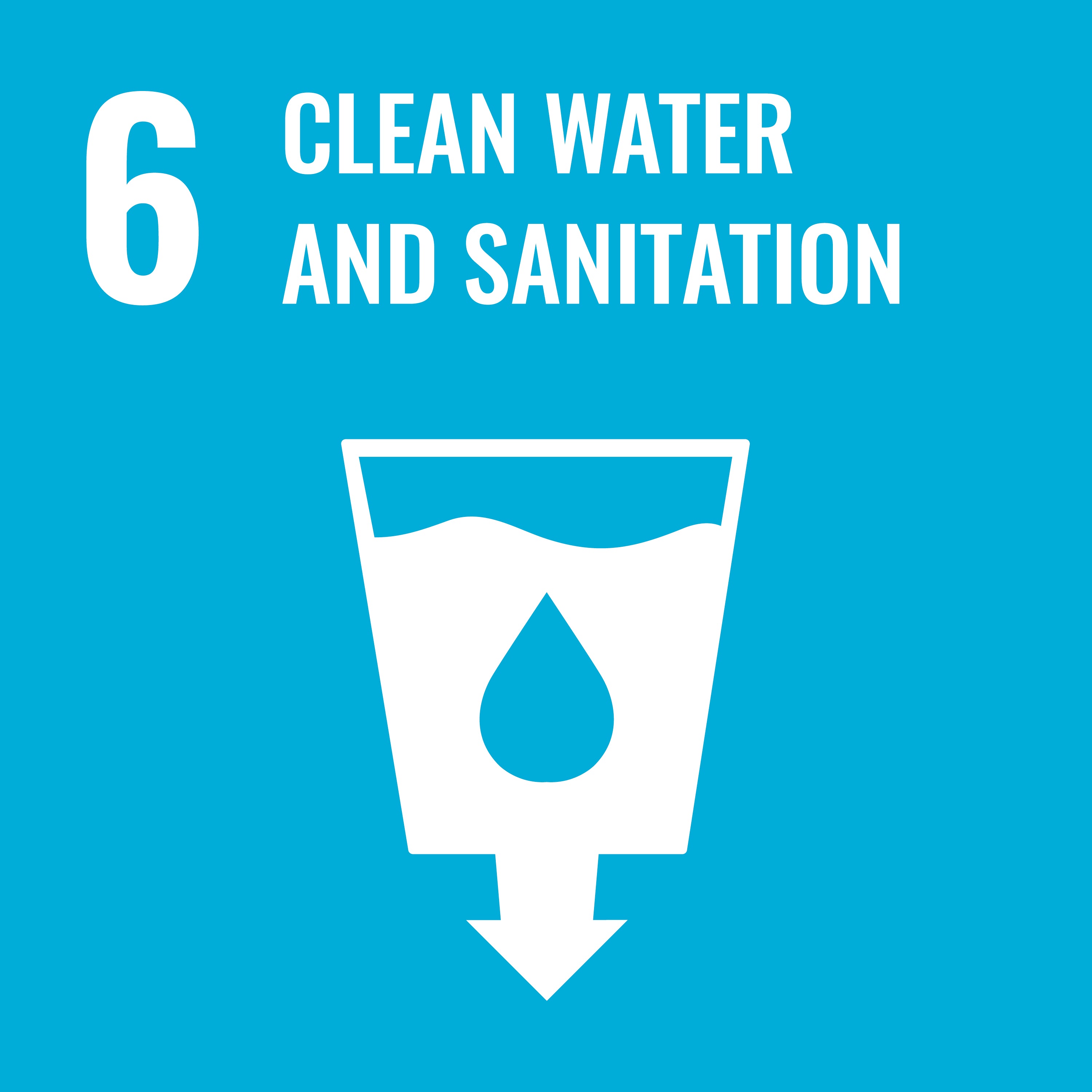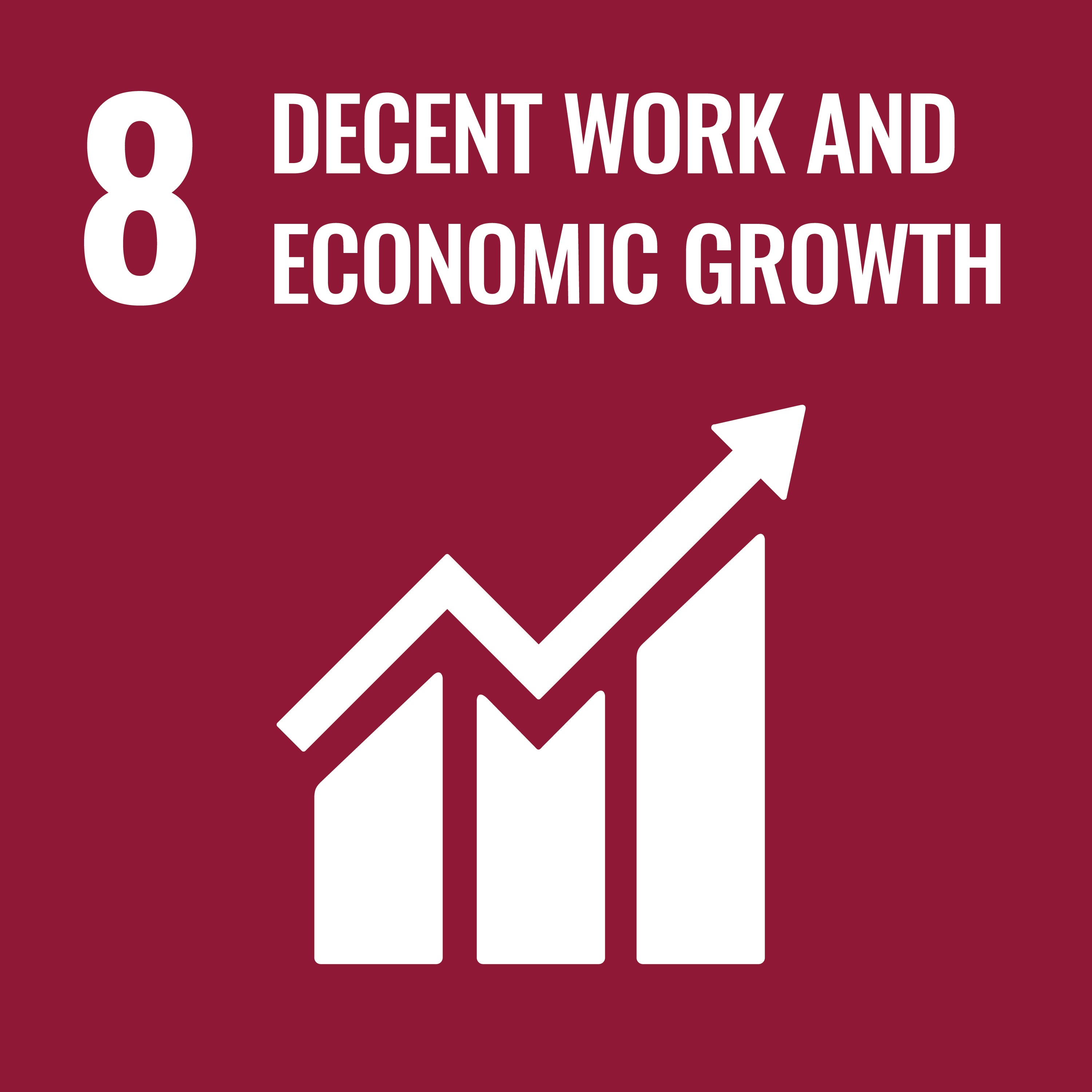2022 Impact Report

In 2022 Baraka, with support from our customers and their customers, was able to make an impact on the social, economic and environmental well being of women and communities in rural Ghana. We are far from perfect, and are learning as we go but read on to see what we have been able to accomplish this year by working together with our partners in our value chain.
Jump to Contents
1. Social & Community Economic Impact
2. Environmental and Ecosystem Impact
3. SDG Impact Summary
4. Other notable events and activities
1. Social & Community Economic Impact
Economic survival is a daily struggle for many in Ghana and especially so for women in remote, rural communities. Opportunities to earn cash income are sparse, and often result in literally pennies/day for hard, difficult work.
Women are key household breadwinners and must adjust their income strategies according to seasons and opportunity. Collecting shea nuts and preparing shea butter, along with farming, petty trading and other activities are traditional income sources, but the return on labour is often very little.
Income Generation Training
Over the course of 2022 we provided direct income generation training to 680 rural women, who averaged two days of training each for a total of 1,360 training days. The training largely focused on how they could earn more money from the activities they were already doing.
Trainings were organized in conjunction with the local women’s groups to ensure there wasn’t a scheduling conflict with market days or other important activities.
Baraka team members traveled to the community to deliver the training right in their communities to make it as easy as possible for them to attend
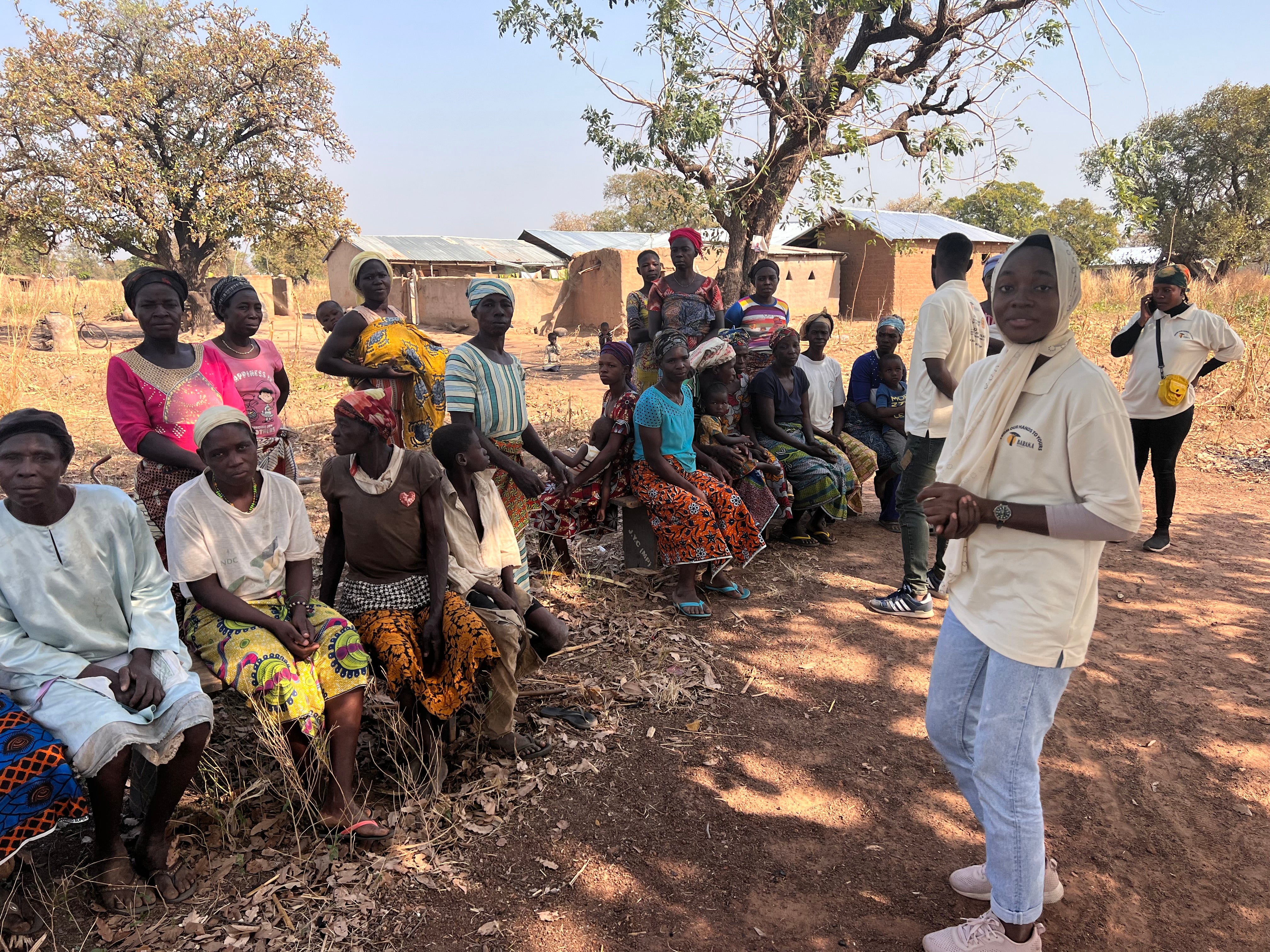
|
|
Overall Income Generation Impact
Baraka’s operations, fueled by the purchases and commitment of our customers, provide income generation to thousands of rural women scattered throughout much of the country.
From the 680 registered, trained and contracted Organic Shea Nut collectors and producers in the Upper West region to the thousands of women involved in the value chains that produce other Baraka products and ingredients, our customer’s purchases touch the economic lives of many thousands of rural women and their families.
We provide primary or significant cash income for close to 1,000 women and families and supplemental income or a few thousand more. Nothing major when you consider the impact of larger businesses but, because of the commitment and support of our customers, we are able to ‘punch well above our weight’, making an impact out of proportion to the small size of our business.
Over 2023 and beyond we look forward to working with our customers and other stakeholders to increase the economic impact footprint of the Baraka supply chain.
Below is a summary of the general income and economic impact created by our customer’s purchases from the Baraka supply chain
SHEA BUTTER680 registered and contracted shea nut collectors and shea butter processors are the lifeblood of our shea butter value chain. Many earn a substantial amount of their annual cash income from shea butter. Every order our customers make has a direct impact on them and their families and communities. Handmade Baraka Shea Butter originates from the shea forests in Ghana’s Upper West Region. Shea Nuts and fallen shea fruit are hand-collected and prepared during the May-August season. The nuts are transported to our shea butter processing centre near Wa where it is made into shea butter and shipped to our distribution centre in North America and to directly to bulk customers worldwide. To learn more about how hand-made shea butter is produced check out this blog and video |
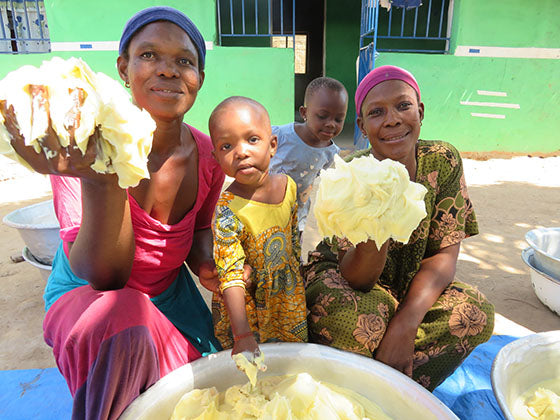
|
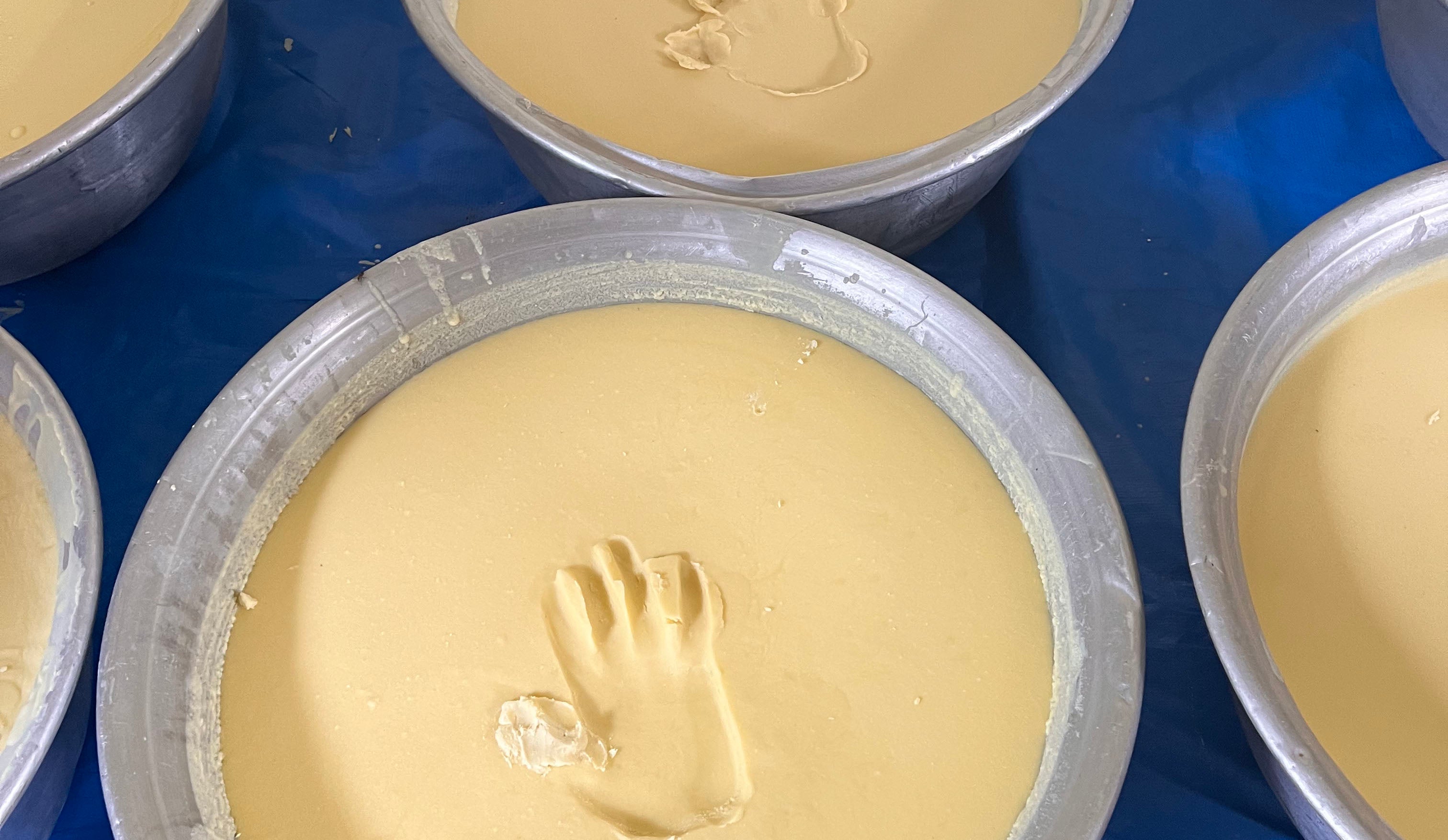 |
 |
KOMBO BUTTERSeveral hundred Kombo Nut collectors and over 100 Kombo Butter producers are involved in the Kombo Butter value chain. Kombo Nuts are collected in the Kakum area in collaboration with our partner Nature Conservation Research Centre, who work in cocoa farming communities. They help cocoa farmers to learn how to collect Kombo Nuts, augmenting their income and helping to prevent cutting of the Kombo trees and associated loss of biodiversity The Kombo Nuts are transported north to Wa, where the same ladies who turn shea nuts into shea butter, turn the Kombo Nuts into Kombo Butter. This is a total reversal of the ‘normal’ flow in Ghana where raw material is normally transported towards the Capital of Accra for further processing We are still in the early stages of developing the Kombo Industry and look forward to working with our partners and customers to help more people learn of the amazing qualities and properties of Kombo Butter. |

|
 |
 |
PALM OILSThousands of smallholder growers work in the Palm Oil supply chain that Baraka is part of, earning the bulk of their cash income from the palm industry. However, Baraka is not a major player so our income impact on any one family is not significant. We work with Benso Oil Palm, an RSPO Certified Facility who works with thousands of smallholder palm growers, including those from Golden Star Oil Palm Plantation, a project our founder, Wayne Dunn, helped establish through his work as a social responsibility and sustainability consultant. While we don’t have a major economic impact on women and families in the palm oil supply chain, we are working with others in the industry to help educate and inform the market of the value and benefit of Ghanaian Palm Oil and the positive social and environmental impacts it has. |

|
 |
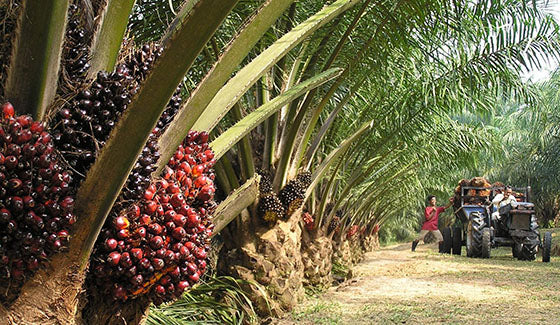 |
COCOA BUTTERThere are tens of thousands of smallholder cocoa farmers involved in Ghana’s cocoa sector. Baraka’s direct involvement is limited to those that are also Kombo Nut collectors in the areas near the Kakum National Park Our partner, Nature Conservation Research Centre, works extensively with smallholder cocoa growers in the area supporting increased economic impact as well as facilitating improvements in the industry’s environmental and ecosystem impact. Together with our collective work in the Kombo Industry, where we work with the same producers, this has both a direct impact on individual incomes and livelihoods as well as a broader, more systemic impact on income generation and ecosystem management. |

|
 |
 |
BOLGA BASKETSWe work with about 350 basket makers from eight community basket making groups. Each group specializes in a few different baskets. Together with the men who add leather to the handles your basket purchases provide meaningful income to nearly 400 families. Baskets are handwoven in remote rural communities by women working in groups. The baskets are transported to Bolga, the regional capital, where leather is added to the handles of many of them and then they are crushed and packed into sacks. The sacks are shipped to Wa, where the sacks are added to containers with shea butter and other butters and oils going on the bottom and the baskets and other lighter items going on top. It is always exciting when the containers get to the warehouse in Canada and are opened so our Canada team can see what the Ghana team has sent! |

|
 |
 |
COCONUT OILBaraka works with partners in the coconut supply chain, working with several hundred smallholder women and families and a staff of about 20, primarily women, at their certified food grade processing facility. The women and families involved earn the majority of their cash income from the coconut industry and thanks to the purchases made by Baraka’s customers we contribute substantially to that. Coconuts are grown on smallholder farms, often in conjunction with cocoa, palm and other crops. In areas where the plantation is primarily a monoculture coconut the growers are encouraged to plant small subsistence crops to support food security and biodiversity. Coconuts are harvested as they ripen and drop to the forest floor. The are put in small piles, one by one by one, and then carried back to the yard for sorting. From there they head to the processing facility where they are graded and carefully processed to export quality food grade standards, passing through either the cold press process or the traditional process that uses heat and leave the intense flavour we love and the soaping qualities loved by so many. |

|
 |
 |
OTHER INGREDIENTSWe work with supply chains in a number of other areas to provide other pure, natural products and ingredients to customers throughout North America and around the world. From Baobab Powder to Black Soaps to Moringa Powder and so much more. All products are handmade and/or hand grown and harvested. All have a focus on the impact on local women and families and how we can procure them and bring them to market in a way that stewards the environment and natural resources. |

|
Konjeihi Women’s Enterprise Centre
Baraka, with support from its customers, including especially evanhealy, tries to construct Women’s Enterprise Centres to both provide infrastructure for Baraka’s work, and to provide the women with infrastructure to support their year-round income generation work.
Earning enough income to support their children and families is a perpetual struggle for women throughout much of Ghana, and especially in the remote, rural communities in northern Ghana where Baraka operates. Because of how the economic reality they live in, and the available resources and opportunities around them, this means that most women rely on a range of activities and opportunities for economic survival
While the income earned from working with Baraka on the production and preparation of Shea Butter, Kombo Butter and other ingredients has become a critically important component of their income, other activities like farming, production and trading are also vital for them.
The Konjeihi Women’s Enterprise Centre has quickly become an activity hub, where the women can gather to work, visit and earn income.
The Konjeihi Women’s Enterprise Centre has served as the pilot sit for the Waste to Fuel initiative that is reducing carbon emissions and deforestation associated with Shea Butter production.

|

|

|

|
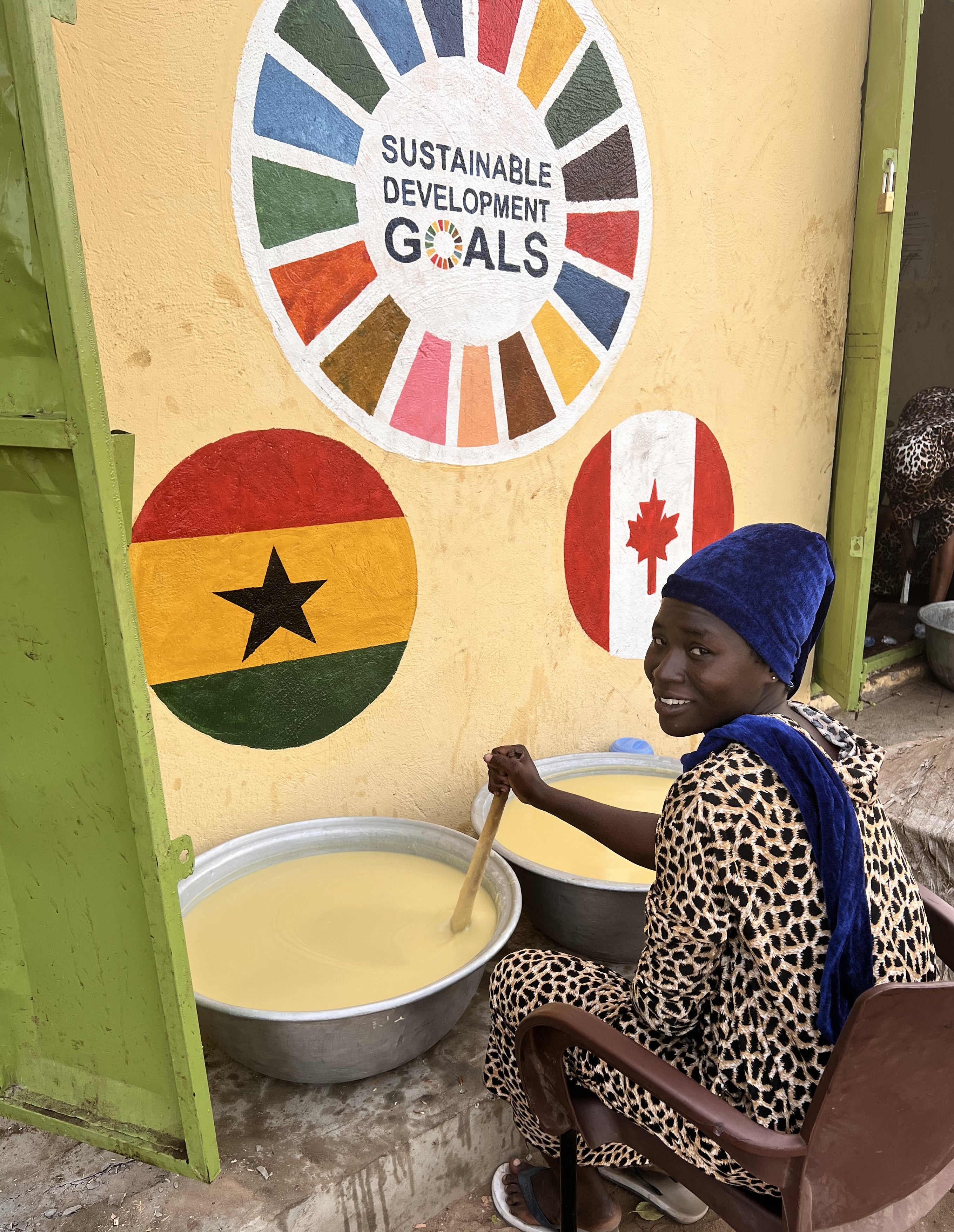
|

|

|

|

|

|
Konjeihi Community Water Supply
|
The Konjeihi community has existed for years without a good community source of potable water. The community well water was ‘safe’ but residents did not like the taste. Water is the source of life everywhere and early in our planning for the Konjeihi Women’s Enterprise Centre we began working with the community and our leadership to see how we could best include a community water supply in the new Centre. The preparation began in late 2022 and by early 2023 the community was enjoying fresh, clean, potable water from the Centre. |

|
 
|

|
Moving Packaging to Ghana
Prior to 2022 we did all our repackaging and small size packaging in Canada. In 2022 we began moving packaging to Ghana, starting with some of the easier to package products and, by year end, doing nearly all packaging in Ghana.
This not only provides income opportunities and employment in Ghana, but it also makes the warehouse operations in Canada simpler and more efficient. For the most part Kristal and Meghan are able to simply place the ingredients received from Ghana directly onto the warehouse shelves where they can be picked for order fulfillment.
We are still working on some items. The hot temperatures in Ghana make it difficult to package oils like Coconut Oil, Palm Oils, etc. without a large investment in specialized equipment. But, for the most part, by the end of Dec 2022 we were set up to do 90% of our consumer facing packaging in Ghana.


|

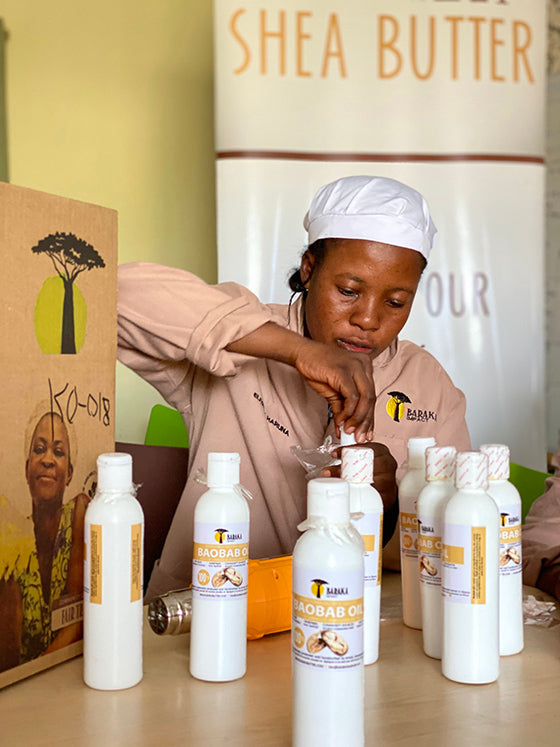
|
Eco-Ergonomic Shea Roaster Project
Baraka is a small player in the shea butter industry but ever since commencing operations we have looked for ways we could have an impact that would not just be good for the women and communities we work with but would go beyond our operations and help move the industry forward.
In 2016 we partnered with evanhealy, to introduce drum roasters to the communities we worked with. This was a significant improvement from the pot and paddle method used traditionally, but, even though the fuel efficiency and ergonomics were improved, we weren’t satisfied to stop there.
In 2022 we were approached by Burn Design Lab to collaborate with them on a new eco-ergonomic shea roaster design they were developing. Of course, we immediately reached out to our friends at evanhealy who enthusiastically joined the project with us.
The new roasters are a significant improvement. Women can sit at a comfortable height and the work is much more ergonomic. The enclosed, fire-brick roasting chamber is much more energy efficient and creates up to 90% improvement in carbon impacts with our Waste to Energy fuel recovery project
The roasters are easier to use, keep smoke and heat away from the women and, with the built in thermometers help ensure even, smooth, consistent roasting.
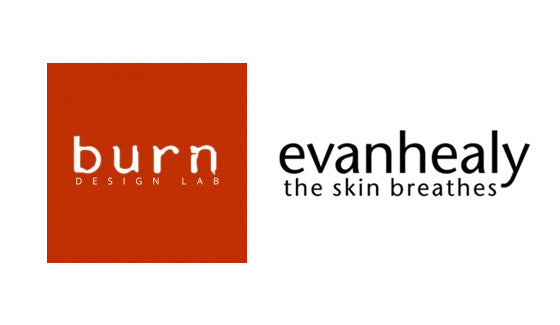
|

|
|
|

|
Tapko Women’s Enterprise Centre
Tapko was the first community Baraka began working with, going back nearly 20 years ago. It was more of a personal relationship as there was no business involved.
One of Baraka’s earliest projects, again before a formal business developed, was a Girl Child Education project where we raised money in Canada and worked with a local Tapko man, to manage the project. Around the same time we were approached by a local tree-planting couple who wanted to volunteer at a community in Africa. We worked with Tapko and organized a project where Greg Horne and his partner spent a few months in the community.
While there they created a small centre to provide local women with a secure storage area and a covered place to work. They also worked with a local lady from Wa, Aunty Amina, who Baraka supported to run income generation training for the women in the community.
As well, they organized a tree planting project while they were there.
In 2022 Baraka was approached by Greg Horne who, very generously, wanted to know how he could provide further support for the women in Tapko. We met with the women and leadership and they said their priority was the rebuilding and expansion of the centre Greg and his partner built for them.
With a generous contribution from Greg, combined with funds Baraka’s customers had donated through the Tips program, the women’s centre was rebuilt.



|


|
2. Environmental and Ecosystem Impact
Shea Waste to Fuel Circular Economy Initiative
|
Baraka Impact is pioneering a closed loop, waste to energy process that provides 100% of the fuel energy for processing shea butter, while mitigating climate change, supporting biodiversity and ecosystem health and providing local employment. Jump to content:
Fuel Energy for Making Shea ButterThe Baraka Way (Waste to Energy, combatting deforestation) |
 |
|
We aren’t perfect, and we aren’t all the way there. Yet. But, with the support and encouragement of our customers and their customers we are making progress, innovating and making change. With your support, we continue trying to make the shea butter industry more beneficial and impactful for the women producing shea butter and more restorative and less harmful for the environment and ecosystems. Follow along to see an exciting new initiative |
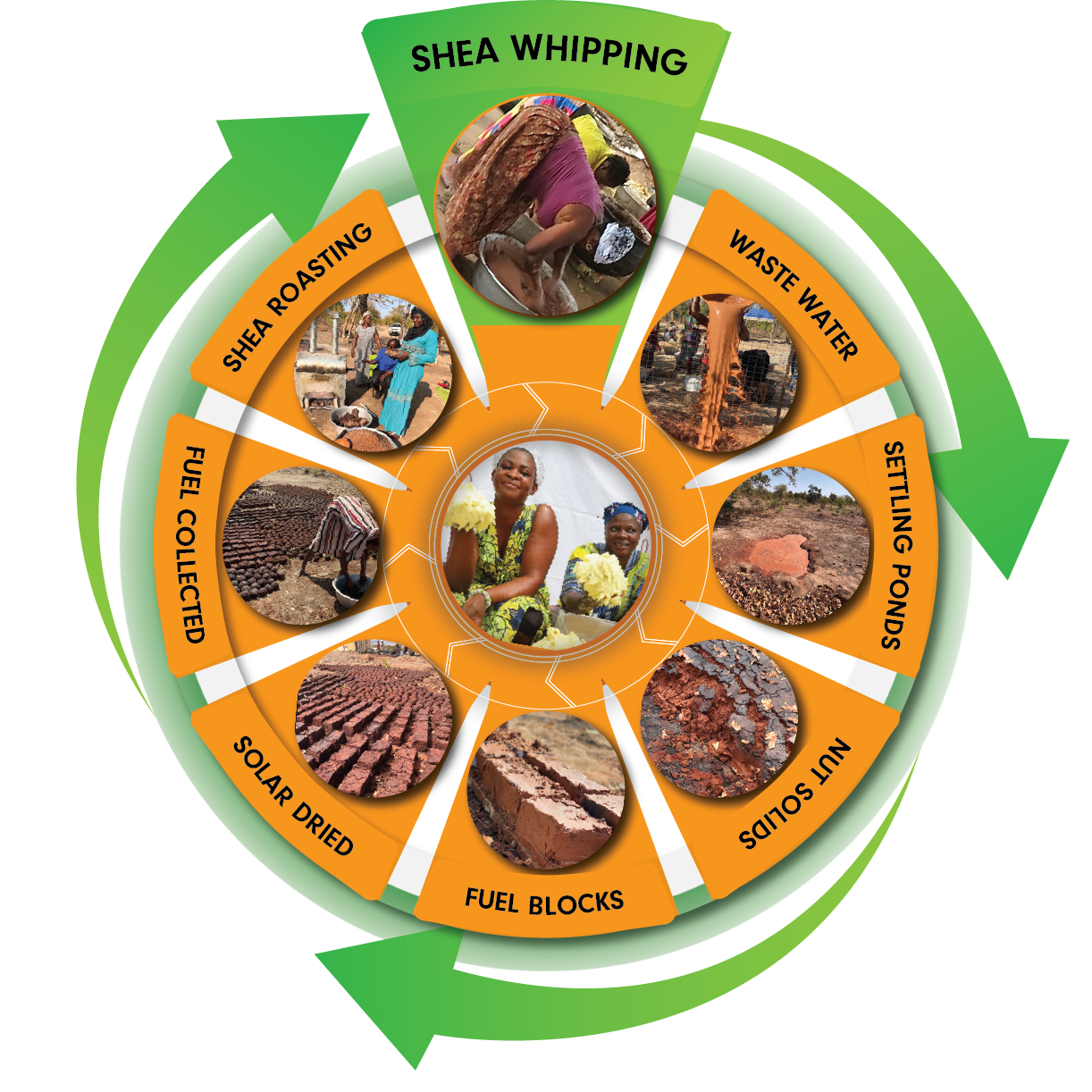 |
SHEA WHIPPINGWhipping the kneaded and roasted shea coagulates the oils, leaving behind waste water saturated with shea nut solids |
|
|
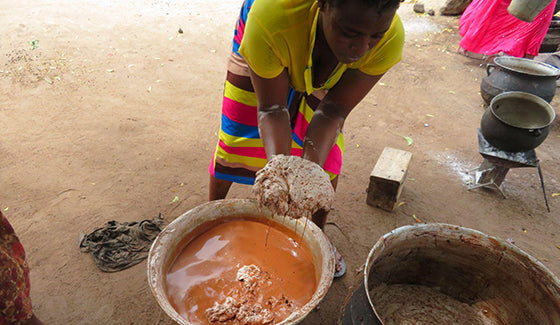
|
 |
WASTE WATERWaste water is dumped and left for the water to evaporate and drain, leaving behind nut-solids to be made into waste to energy solar dried fuel blocks |
|
|

|
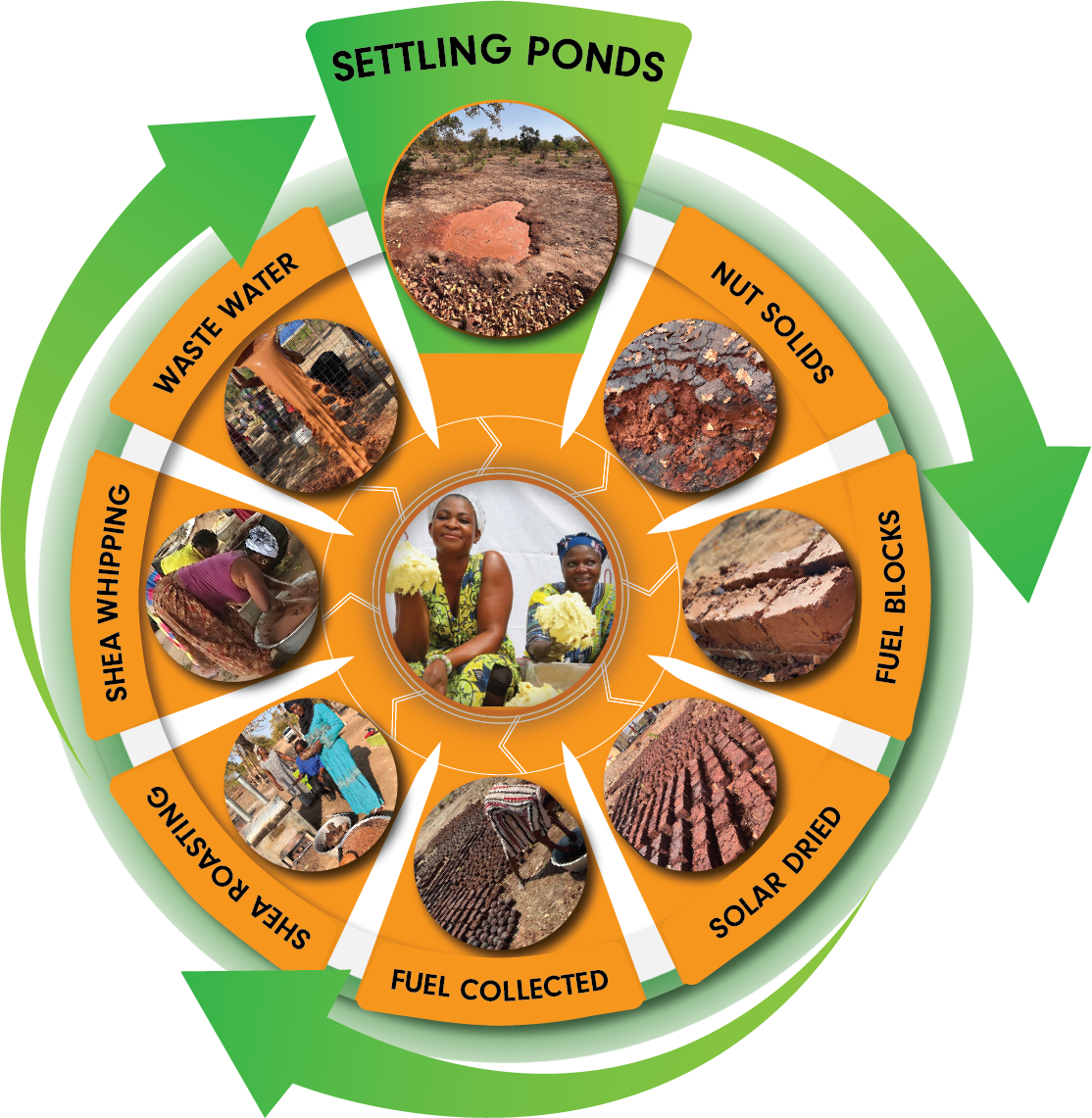 |
SETTLING PONDSWaste water is dumped and left for the water to evaporate and drain, leaving behind nut-solids to be made into waste to energy solar dried fuel blocks |
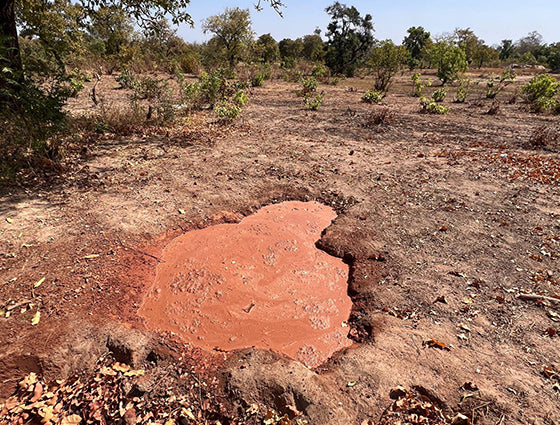
|
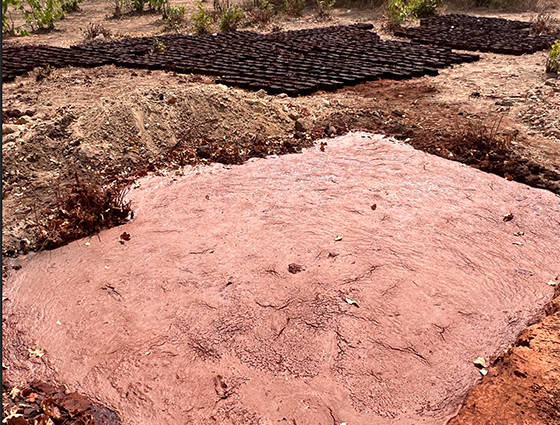
|
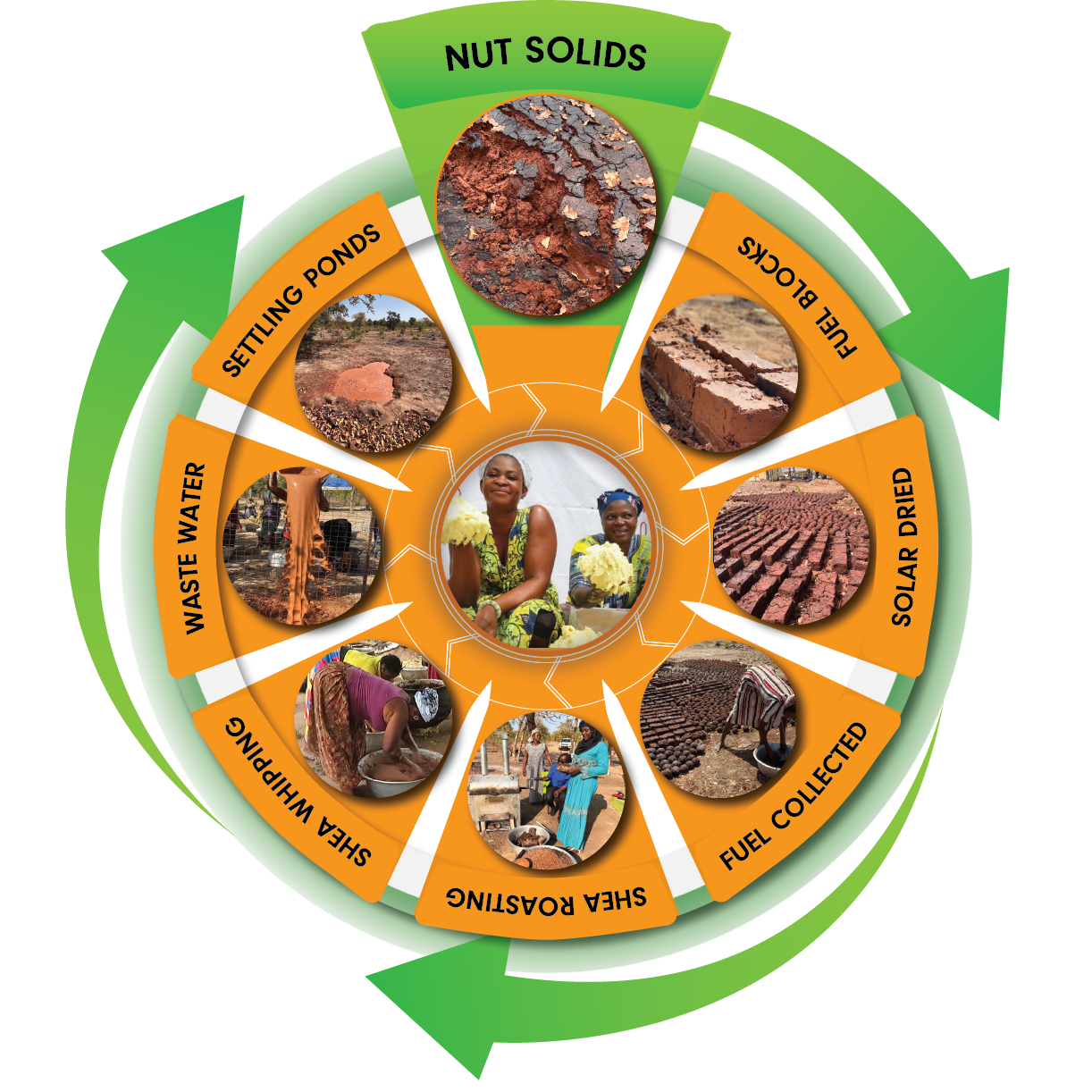 |
NUT SOLIDSThe waste water is left to settle and evaporate, leaving behind shea nut solids which are an excellent fuel source. The solids are shoveled into a wheelbarrow and taken to be made into fuel blocks. |
|
|
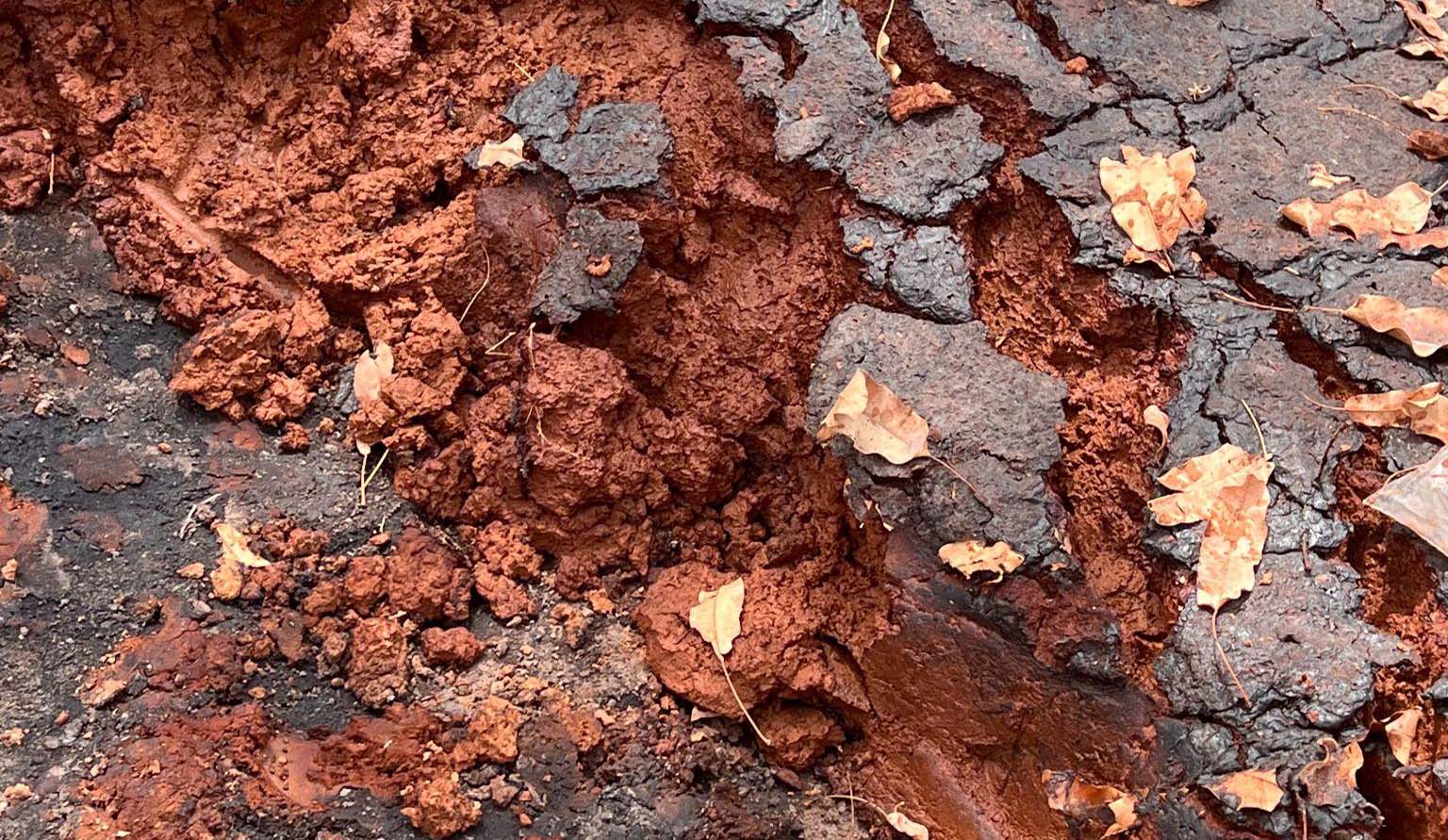
|
 |
FUEL BLOCKSThe shea nut solids are made into fuel blocks and balls. Sometimes the women like the smaller, handmade balls and sometimes they prefer the larger, molded blocks. |

|

|
|
|
|
 |
SOLAR DRIEDThe fuel blocks and balls made from shea nut waste are left to dry using solar energy. |

|

|
 |
FUEL COLLECTEDWhen they are dried enough that they will burn hot and virtually smoke free (which the women much prefer to the traditional firewood which is smokey and doesn’t burn even) the fuel blocks are collected and taken to be used in shea roasting and boiling |

|
|
 |
SHEA ROASTINGThe fuel blocks and balls are used for roasting and boiling shea butter |

|

|

|

|
 And, here is what we get. Made with 90% less climate and carbon impact. An amazing product for your skin and hair, incredible impact on the women and communities that make it and supporting biodiversity, ecosystem health and wildlife habitat. All made possible by customers like you, who believe that business can and should create social impact and be an effective steward of the environment at the same time as it makes profit and creates business value. |

|
The “Normal” Way (Cutting trees for firewood)This is the traditional way of gathering the energy needed for making shea butter. This is still used by nearly all in the industry today.
|

Waste to Energy
The Story in Words
- The process involves no mechanization and is based on an integration of traditional knowledge and ingenuity from northern Ghana, coupled with pragmatic engineering insights gained from decades of Saskatchewan farming and logging experience.
- Making shea butter from shea nuts leaves behind nearly 60% of the biomass as waste. Historically, for commercial hand-made shea production processes this was a problem to be dealt with, too often left to scatter over local landscapes and drain into waterways.
- While the waste is entirely organic, with no added chemicals or anything, it still leaves an unsightly mess and builds up rapidly. And, at the same time as this organic waste is causing a problem and creating cost for dealing with, most processors are buying firewood for the roasting and boiling that is part of making hand-made shea butter.
- Too often this fire wood is actually shea trees, cut down needlessly, decimating the shea forest, accelerating climate change and destroying ecosystem health and wildlife habitat.
- We are a long way from perfecting this process, and we have borrowed heavily from local knowledge. We still need to work out how to do it at a greater scale, and sort out how to do it in the rainy season when we can’t leave it out for days to dry.
- But, we are really encouraged by the progress we have made. The women prefer the recovered waste for fuel. It burns hotter and with less smoke than firewood and is easier to manage the heat with.
- While we have had this project in mind for some time, and have made small forays into doing it, we must give credit to Burn Design Lab and evanhealy, our partners on the new Eco-Ergonomic Shea Roaster project. The new roasters and the leap forward they made in mitigating the environmental impact of shea processing inspired us to invest time and effort into scaling our Waste to Energy concept.
Carbon Offset for Shipping on all E-commerce
We began offsetting carbon emissions on shipping to customers in 2022. We began with a voluntary program where customers could voluntarily pay to offset the carbon emissions from shipping their orders.
It was very popular with our customers, with up to 75% voluntarily paying to ship carbon neutral. That was all the encouragement we needed and mid-way through the year we partnered with Cloverly and offset 100% of the carbon emissions from shipping. There are no extra costs to the customer - this is just part of the service they receive.
The carbon offset fees go to support an energy efficient cooking stove project in Kenya that helps rural women reduce energy consumption and decrease their carbon footprint. The project was actually launched by our partner on the Eco-Ergonomic Shea Roaster Project, Burn Design Labs.

|

|
Combating Deforestation
In 2022 we incorporated deforestation education information into every community training session. We delivered this training and education directly into remote, rural communities, reaching over 500 women, most of them on two or more occasions. We also worked closely with local and traditional leaders to help anchor the importance of combating climate change and deforestation
In 2023 we will continue with education and workshops on deforestation. We are evaluating the potential to develop stand-alone workshops that could be delivered at the community level and also the development of Deforestation Education Posters that could be placed in communities where we work and made available to other organizations and communities throughout Ghana
We also launched a circular economy, fuel to waste program that is providing virtually 100% of the fuel needed for shea butter processing from waste generated through shea butter processing. Read more here

|

|
We also continued our work with Nature Conservation Research Centre to develop the Kombo Butter industry and reduce the unnecessary cutting of Kombo Trees in the Cocoa forest landscape.
This is directly impacting forest biodiversity in cocoa growing areas. Instead of cutting down Kombo Trees the communities are leaving them to grow and enable income to be earned from collecting the fallen fruits/nuts. This not only combats deforestation and promotes local biodiversity but provides local income with important supplemental income opportunities Learn more here

|

|
Riverine Ecosystem, Biodiversity and Wildlife Habitat
Baraka worked with Nature Conservation Research Centre (NCRC) to hardwire ecosystem health, wildlife habitat enhancement and riverine biodiversity and ecological health into the design of our Organic Shea Nut Collection areas.
Working along the banks of the Black Volta River the development of the organic collection zones reduces chemical and fertilizer use, combats deforestation and is expected to have significant impacts on birds and wildlife (while we haven’t conducted detailed surveys at this time, anecdotal evidence suggests it is already making an impact)
In addition, the project provides important income generation opportunities for local women, helping them to earn income for environmentally sustainable practices.

|

|
3. SDG Impact Summary
Baraka is a small SME but takes the United Nations Sustainable Development Goals very seriously. We consciously optimize our SDG impact across all that we do and take pride in the breadth and depth of that impact, which is fully supported by our customers and their customers
Baraka’s Impact on the Sustainable Development Goals
Baraka is impacting 16 of the 17 United Nations Sustainable Development Goals (SDGs).
With the support of our customers and their customers, we are thrilled to share this short report on our SDG Impact. The SDGs were adopted unanimously by all member nations of the United Nations and provide the framework for working towards a more fair, equitable, sustainable and just future for all.
As a small business there is little we could do were it not for the enthusiastic support of our entire community.
Click on any of the 17 SDGs to read how Baraka, with your help, is directly contributing towards each individual goal.
This is your accomplishment. Thank you for sharing this journey with us and for making the world just a little bit better.
 |
End poverty in all its forms everywhere
| |
End hunger achieve food security and improved nutrition and promote sustainable agriculture
| |
Ensure healthy lives and promote well-being for all at all ages
| |
Ensure inclusive and equitable quality education and promote lifelong learning opportunities for all
| |
Achieve gender equality and empower all women and girls
| |
Ensure availability and sustainable management of water and sanitation for all
| |
Ensure access to affordable, reliable, sustainable and modern energy for all
| |
Promote sustained, inclusive and sustainable economic growth, full and productive employment and decent work for all
| |
Build resilient infrastructure, promote inclusive and sustainable industrialization and foster innovation
| |
Reduce inequality within and among countries
| |
Make cities and human settlements inclusive, safe, resilient and sustainable
| |
Ensure sustainable consumption and production patterns
| |
Take urgent action to combat climate change and its impacts
| |
Conserve and sustainably use the oceans, seas and marine resources for sustainable development
| |
Protect, restore and promote sustainable use of terrestrial ecosystems, sustainably manage forests, combat desertification, and halt and reverse land degradation and halt biodiversity loss
| |
Promote peaceful and inclusive societies for sustainable development, provide access to justice for all and build effective, accountable and inclusive institutions at all levels
| |
Strengthen the means of implementation and revitalize the global partnership for sustainable development
|
4. Other notable events and activities
Social and Environmental Impact Awards
Baraka’s work (really the work of Baraka’s team with the support of Baraka’s customers) was recognized for three exciting awards this year.
While the awards were presented in Accra, we knew that much of the work to earn them came from the team in Wa so we took the awards and certificates to Wa to share them with the team and recognize the work they put into winning them.
SME of the year
|
SDG Pioneer of the Year
|
Best Fair Trade Shea Butter Company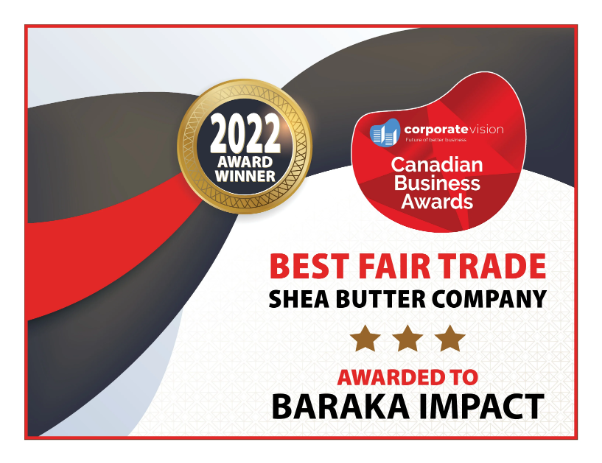
|
Team Baraka With Their Awards
|
Dignity of Income Fund, Tips and Donations
In 2022 the Dignity of Income Fund contributed to and supported many impactful projects that enhanced social, economic and environmental sustainability across our supply chain. These included
- Income Generation Training for 680 rural women
- Construction of the Konjeihi Women’s Enterprise Centre
- Development of a Community Water Supply in Konjeihi
- Refurbishment of the Tapko Women’s Enterprise Centre
- Community Education on Deforestation
- Development and Launch of the Eco-Ergonomic Shea Roaster initiative
- Development of the Shea Waste to Fuel Circular Economy Initiative
Total cost of these initiatives was over $50,000. Financing for them was provided
- 15% - Tips on checkout program
- 20% - direct donations and support from Baraka’s customers
- 65% - Baraka’s direct contribution and support
Tips Contributed at Checkout
In 2022 our customers contributed $7,345.07 in tips that they added at checkout. More than 30% of all orders added tips at checkout that went directly to Dignity of Income activities. Both of these are a 50% improvement on 2021 performance and we want to thank our customers for stepping up and demonstrating their commitment to the social, economic and environmental well-being of the hard-working women who make Baraka ingredients. Together we are making a difference
function scrollFunction() { if (document.body.scrollTop > 20 || document.documentElement.scrollTop > 20) { mybutton.style.display = "block"; } else { mybutton.style.display = "none"; } }
// When the user clicks on the button, scroll to the top of the document function topFunction() { document.body.scrollTop = 0; document.documentElement.scrollTop = 0; } // ]]>
Connect With Us!













